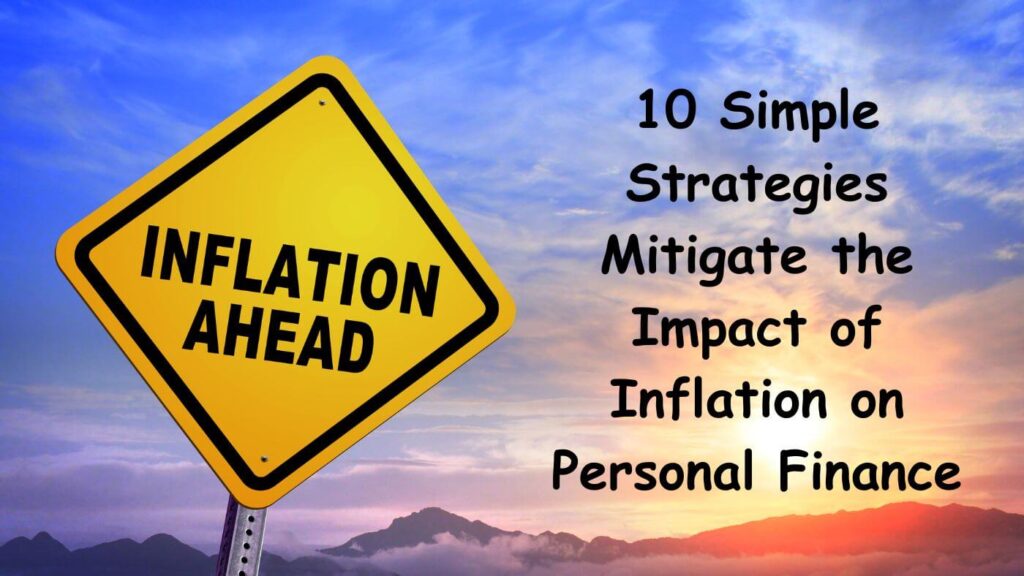Have you ever wondered how inflation silently chips away at the value of your money, affecting your finances? Inflation acts like a sneaky thief, making living costs more expensive. In this blog, we’ll delve into the impact of inflation on your hard-earned money, understanding its effects on personal finance and equipping you with savvy strategies to safeguard your financial well-being.

What is Inflation?
Inflation is why prices for goods and services increase gradually over time. In simple words, your money will buy less in the future.
For example, if a loaf of bread costs ₹50 now, but next year it costs ₹55, that’s because of inflation. So, your money won’t buy as much bread in the future.
Impact of Inflation on Personal Finance:
- Reduced Purchasing Power: When inflation increases, the value of your money decreases, resulting in the need for more money to purchase the once cheaper items.
- Increased Cost of Living: With inflation on the rise, the overall cost of living increases. Necessities like groceries, utilities, and housing become more expensive, putting pressure on your budget.
- Impact on Savings and Investments: Inflation impacts savings and investments. Traditional savings accounts with low-interest rates may not keep up with inflation, causing savings to lose value. Similarly, investments with returns lower than inflation can decrease purchasing power.
- Retirement Planning: Inflation can complicate your early retirement plans. The cost of living during retirement might be higher than anticipated, requiring a more substantial retirement fund.
- Debt Burden: While inflation can reduce the actual value of debt, higher inflation can lead to higher interest rates, making loan repayments more expensive.
- Wage Growth: Inflation can influence wage growth. As inflation rises, workers may demand higher wages to keep up with the increasing cost of living. However, your income can decrease if wage growth doesn’t match inflation.
- Financial Planning: Incorporating inflation into your financial planning is essential. You must consider rising prices while setting your financial goals.
- Real Estate: Inflation can impact the real estate market, affecting homebuyers and property investors. Property prices may rise due to inflation.
- Cost of Borrowing: Fluctuating inflation can influence interest rates, making borrowing costs, such as loans, mortgages, and credit card debt, more expensive.
How to Mitigate the Impact of Inflation on Personal Finance:
- Invest in Inflation-Protected Assets: Allocate a portion of your investments to inflation-protected assets like Treasury Inflation-Protected Securities (TIPS) or inflation-indexed bonds that adjust with inflation.
- Diversify Your Investment Portfolio: Spreading your investments across different asset classes can help reduce the impact of inflation.
- Embrace Real Assets: Invest in tangible assets like real estate or precious metals, which can retain or increase their value over time, as a hedge against inflation.
- Reevaluate Fixed-Income Assets: Consider diversifying into other assets like equities that historically outpaced inflation.
- Invest in Stocks: Quality stocks have historically provided returns higher than inflation, making them a potential defence against eroding purchasing power.
- Consider Inflation-Adjusted Insurance: Regularly review your insurance coverage to account for inflation’s impact on replacement or repair costs.
- Stay Ahead with Regular Budget Reviews: Frequently review your budget and adjust it to accommodate inflationary pressures.
- Increase Your Income: Exploring opportunities for career advancement or side gigs can help counter the effects of inflation on your finances.
- Monitor Interest Rates: Stay updated on any changes in interest rates so you can grasp how they will affect your monthly payments.
- Long-Term Financial Planning: Incorporate inflation into your long-term financial planning and set realistic goals for inflation’s impact over time.
Final Words:
Understanding the impact of inflation on personal finance is vital for securing your financial future. By implementing proactive strategies and staying informed, you can protect your money from the erosive effects of inflation. Safeguarding your finances against this silent enemy ensures financial stability in an ever-changing economic landscape.
